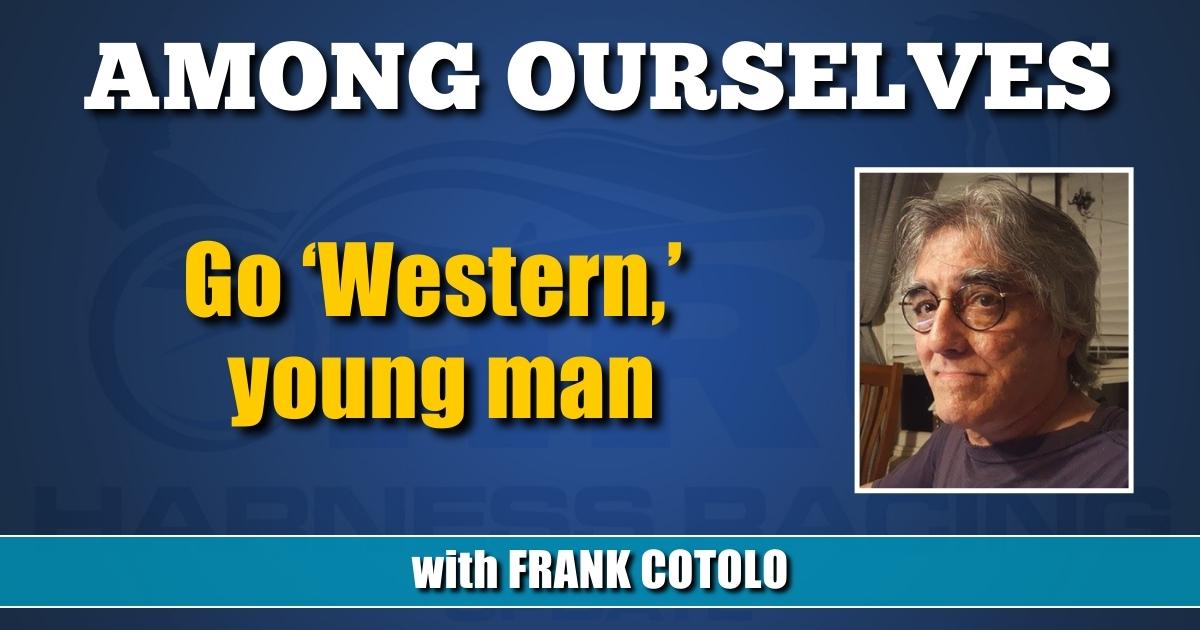Go ‘Western,’ young man
by Frank Cotolo
I lived in a borrowed room in the Bel Air Sands Hotel which stood in disrepair on the fringes of the wealthiest real estate in the Westwood, Bel-Air, Brentwood Hills sections of Los Angeles County. While the two levels of the structure were being renovated the boulevard hotel area accepted guests and a dozen or so rooms lining the hillside offered bargain-priced rooms on a month-by-month basis. There was no lease. There was only an unwritten deal that the hilltop apartment population would be unwelcomed once all dwellings were refurbished.
My room overlooked the San Diego Freeway, a few exits from Hollywood proper and another few to downtown Inglewood, the ragged edge of the fabled city and location of LAX Airport.
And Hollywood Park.
And the Western Harness Racing meet.
I spent most nights traveling to and around Hollywood in my Bundy Rent-A-Wreck car to sell jokes to up-and-coming comics at L.A. comedy clubs, but once I found out the classic Hollywood Park held a harness racing meet at night, I made plans to share my evenings visiting the mile track. Having an east coast relationship with the sport I knew it was possible that I could make as much or more money betting harness races than as a five-dollars-a-joke salesman. Do not get me wrong. My jokes were good but 1978 was a time when most comics wrote their own material and that made competition fierce.
All in all, I was a stranger in Los Angeles but when I made my first trip to Western Harness Racing at Hollywood Park, I was not a stranger in a strange land. I paid for parking and I paid for admission and a program an hour before post time. I strolled the apron while horses scored and I felt at home. The sun was on the wane as smoke from ascending airplanes billowed and jet engines thundered. Noise? Toxic fumes? Nothing this boy from Brooklyn found oppressive. I took a deep breath and lighted a cigarette. Then I went to the Food Court and bought a coffee and found a bench on the apron where I read the evening’s program.
Before thinking about handicapping, I looked at every page in the program to become acquainted with the format. No problem. Then I was thrilled being introduced to a fresh cast of horses and horsemen. First, the drivers. Not one name was familiar to me and that was exhilarating so I embraced each before seeing one race. These were the members of a western ensemble that were as far from the madding eastern crowd as me.
Let me drop some driver names off the top of my head and in no particular order: Joe Lighthill, Steve Desomer, Mary Madland, Rick Kuebler, Gerry Longo, Gene Vallandingham, Robert Sleeth, John Tessier, Jim Grundy, Al Bahouth, Stan Bayless, Ken Williams, James Lackey, Ross Croghan, Tim Maier, James Todd, Jim Butler, Frank Sherren, Jim Mueller, Rick Stermmerman, Nicol Tremblay, Todd Ratchford, Carlo Fisco, George Cliff, Gabriele Bernat, Lou Pena, Gary Budahn, Gary Perry, Brian Pelling and Shelly Goudreau. All regulars.
Many drivers were also trainers but most trainers rarely drove, including Bob Johnson, Roger Stein, Robert Gordon, Tim Dilberto, Craig Owen, Paul Blumenfeld and Pat McGonogle.
In the late ‘70s small attendance, tiny purses and marginal betting pools were not good signs of health for a harness meet but the west-based performers survived. There was a racing circuit, albeit shrinking. After Hollywood Park the standardbred population moved 20-some-odd miles southeast to Los Alamitos, a five-eighths track in Orange County. They also had a meet in Sacramento.
But that first season I became a regular the grandstand and the apron were my hangouts and because there were so few regulars, no less bettors in the cheap seats, we recognized one another. Though I kept to myself I was approached by others with the usual “who-do-you-like” greeting. An older fellow approached me one of the first evenings I attended and he did just that. I told him I liked Ike’s Marine. He was delighted because he was on to Ike’s Marine as well and though I did not need him to support my choice we both scored when Shelly Goudreau floated the pacer home in the stretch at double-digits to win. My profit was the price of many more jokes than I ever would have sold at The Comedy Store that night.
I cannot exaggerate how important that first Western harness meet was for me. Friendless, veritably homeless, awakening day to day to machine-brewed coffee and Pop Tarts, I learned to walk the line between self-reliance and tribulation. I took financial risks forcing me to understand math better than I did from grade school through college. It defined success for me, at least by Winston Churchill’s definition. He said, “Success is the ability to go from one failure to another with no loss of enthusiasm.”

















